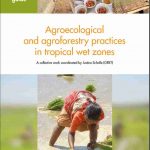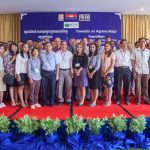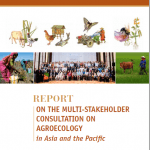10 downloads
Title of document: Integrated Pest Management for Sustainable Intensification of Agriculture in Asia and Africa. Authors: Jules Pretty; and Zareen Pervez Bharucha. Journal’s name if any: Ministry/Government Agency/Organisation: Department of Biological Sciences and Essex Sustainability Institute, University of Essex, Wivenhoe Park, Colchester, UK; Department of Sociology and Essex Sustainability Institute, University of Essex, Wivenhoe Park, UK Year of publication: 2015 Geographic focus: Global level Main issues / topics addressed (for example: farmer field schools; integrated pest management; social capital; sustainable intensification; resilience…) School of agroecology (if any): Web address to original document (if any): Summary: Integrated Pest Management (IPM) is a leading complement and alternative to synthetic pesticides and a form of sustainable intensification with particular importance for tropical smallholders. Global pesticide use has grown over the past 20 years to 3.5 billion kg/year, amounting to a global market worth $45 billion. The external costs of pesticides are $4–$19 (€3–15) per kg of active ingredient applied, suggesting that IPM approaches that result in lower pesticide use will benefit, not only farmers, but also wider environments and human health. Evidence for IPM’s impacts on pesticide use and yields remains patchy. We contribute an evaluation using data from 85 IPM projects from 24 countries of Asia and Africa implemented over the past twenty years. Analysing outcomes on productivity and reliance on pesticides, we find a mean yield increase across projects and crops of 40.9% (SD 72.3), combined with a decline in pesticide use to 30.7% (SD 34.9) compared with baseline. A total of 35 of 115 (30%) crop combinations resulted in a transition to zero pesticide use. We assess successes in four types of IPM projects, and find that at least 50% of pesticide use is not needed in most agroecosystems. Nonetheless, policy support for IPM is relatively rare, counter-interventions from pesticide industry common, and the IPM challenge never done as pests, diseases and weeds evolve and move. Crop pests, diseases and weeds pose a substantial challenge to global food security, poverty alleviation and agricultural livelihoods. Approaches of IPM provide an array of methods by which damage can be reduced. We have demonstrated that for farmers across Asia and Africa, IPM projects have been able to deliver substantial reductions in pesticide use coupled with increased yields. Reduced reliance on synthetic pesticides delivers a range of on- and off-farm benefits, including savings, improved public health and improved natural capital on and around farms. Read More

56 downloads
Title of document: Agroecological and agroforestry practices in tropical wet zones Authors: A collective work coordinated by Justine Scholle (GRET) Ministry/Government Agency/Organisation: GRET Year of publication: 2017 Geographic focus: Mekong Region and Central Africa Summary: This guide is designed as a support tool for technicians and farmers involved in actions to promote and develop agroecology. It is a follow-up to a first technical guide published in 2014 in the Democratic Republic of Congo as part of the DEFIV project, a food security project implemented by GRET, funded by the European Union and Agence française de développement. This guide features two parts: The first part presents the current context and issues of agroecology in tropical wet regions. Having demonstrated the limits of conventional agricultural systems, analysed the effects of deforestation, the green revolution and climate change, the authors specify the objectives and the principles of agroecology, and remind readers of the conditions necessary to promote it. The second part is very operational and covers the various agroecological techniques, which were tested in a tropical wet context with satisfying results in the Democratic Republic of Congo (DEFIV project), Cambodia (APICI project) and Myanmar (Delta and NRS projects). Firstly, the various agroecological techniques are presented, and secondly the plants used to implement these techniques are described. Naturally, techniques such as plant inventories mentioned in this guide are not exhaustive. Read More
11 downloads
Title of document: Integrated Pest Management for Sustainable Intensification of Agriculture in Asia and Africa Authors: Jules Pretty and Zareen Pervez Bharucha Ministry/Government Agency/Organisation: Year of publication: 2015 Geographic focus: Asia and Africa Url original document: http://www.mdpi.com/2075-4450/6/1/152 Summary: Integrated Pest Management (IPM) is a leading complement and alternative to synthetic pesticides and a form of sustainable intensification with particular importance for tropical smallholders. Global pesticide use has grown over the past 20 years to 3.5 billion kg/year, amounting to a global market worth $45 billion. The external costs of pesticides are $4–$19 (€3–15) per kg of active ingredient applied, suggesting that IPM approaches that result in lower pesticide use will benefit, not only farmers, but also wider environments and human health. Evidence for IPM’s impacts on pesticide use and yields remains patchy. We contribute an evaluation using data from 85 IPM projects from 24 countries of Asia and Africa implemented over the past twenty years. Read More
6 downloads
Title of document: Sustainable commercialization of new crop for the agricultural bieconomy Authors: N.R. Jordan; K. Dorn; B. Runch; P. Ewing; A. Williams; K.A. Anderson; L. Felice; K. Haralson; J. Goplen; K. Alterdorf; A. Fernandez; W. Phippen; J. Sedbrook; M. Marks; K. Wolf; D. Wyse; G. Johnson Ministry/Government Agency/Organisation: Science of the Anthropocene Year of publication: 2016 Geographic focus: Global Url original document: elementascience.org Summary: Society is now calling on agriculture to provide goods and services that begin with enhanced production of food and other materials, but range far beyond. For example, agriculture is under increasing pressure to achieve complex sustainability goals such as food security, stewardship of biodiversity, compatibility with energy and water systems, and resilience to climate change and other potential shocks. Read More

31 downloads
Title of document: Consolidated account of the 4 national multi stakeholder workshops on agroecological transition in the Mekong Region Authors: Pierre Ferrand Ministry/Government Agency/Organisation: ALiSEA Year of publication: 2016 Geographic focus: Cambodia, Laos, Myanmar & Vietnam Summary: This report presents a short consolidated account of 4 national multi-stakeholder workshops addressing Agroecological Transition in the Mekong Region and bringing together 225 participants that have been organized between March and June 2016 (Myanmar, Cambodia, Vietnam Lao PDR). Such workshops aimed at sharing knowledge, information and actions between agricultural development stakeholders. Read More
17 downloads
Title of document: Farmer Field School Guidance Document: Planning for quality programmes Authors: Food and Agriculture Organization of the United Nations Ministry/Government Agency/Organisation: Food and Agriculture Organization of the United Nations Year of publication: 2016 Geographic focus: Global Url original document: https://www.google.la/?gws_rd=cr&ei=wzpZV9G3Cp6UvQTSr6CwAQ#q=Farmer+Field+School+Guidance+Document:+Planning+for+quality+programmes+ Summary: Every day we learn more about the global challenges facing food production : global warming, extreme weather, intercontinental invasions by pests and diseases, land degradation and water loss from over-exploitation, and price volatility. Farming, fishing and agroforestry systems are becoming more complex, but we are also learning how local agro-ecosystems provide the underlying services - soil nutrient cycling, pest and dideases regulation, water capture and storage, pollination, genetic resources conservation, coastal protection for aquatic species and from storms that enable farmers to adapt to those challenges. Read More

29 downloads
Title of document: Proceedings of the national multi stakeholder workshop on Agroecology Transition, Cambodia Authors: Lucie Reynaud, Pierre Ferrand and Dr Saythong Vilayvong Ministry/Government Agency/Organization: ALiSEA Year of publication: 2016 Geographic focus: Cambodia This report presents the main findings of the discussions held during the 2 days workshop addressing the agroecology transition in Cambodia in Phnom Penh on the 30th and 31st of March 2016. Read More

31 downloads
Title of document: Proceedings of the national multi stakeholder workshop on Agroecology Transition, Myanmar Authors: Pierre Ferrand, Dr Htet Kyu and Lucie Reynaud Ministry/Government Agency/Organization: ALiSEA Year of publication: 2016 Geographic focus: Myanmar This report presents the main findings of the discussions held during the 2 days workshop addressing the agroecology transition in Myanmar in Yangon on the 7th and 8th of March 2016. Read More

12 downloads
Title of document: Report on the Multi-Stakeholder Consultation on Agroecology in Asia and the Pacific, FAO, Authors: FAO Ministry/Government Agency/Organization: FAO Year of publication: 2016 Geographic focus: Asia and the Pacific Seeking to gain a better understanding of the role that agroecology can play in eradicating hunger and malnutrition, FAO organized the International Symposium on agroecology for Food Security and Nutrition in September 2014 in Rome, Italy, followed by three regional meetings in Asia and the Pacific, sub-Saharan Africa and Latin America and the Caribbean. The Multistakeholder Consultation on agroecology for Asia and the Pacific was held in Bangkok, Thailand on 24-26 November 2015. FAO acted as a facilitator to enable debates and foster collaboration among a variety of actors in order to advance science, knowledge, public policies, programmes and experiences on agroecology, supporting the strengthening of the already-extensive evidence-based knowledge for agroecological approaches in agriculture. The participants in this meeting, representatives of governments, civil society, including peasants, fisherfolks, pastoralists, urban communities, indigenous peoples, women’s organizations, youth and others, academia, and private sector, issued recommendations for the development of agroecology in Asia and the Pacific after two days of discussion. Read More
59 downloads
Title of document: Agroecology Transition in Myanmar: Issues, Status and Stakeholder Mapping Authors: San Thein and Aung Thin Ministry/Government Agency/Organization: GRET / Village Integrated Development Association (VIDA) Year of publication: 2016 Geographic focus: Myanmar This report on situation review of agro ecological transition in Myanmar is the follow up feasibility study (Consultation workshop on agro ecology, held at Yangon, on 12 June 2013) with the support of Groupe de Recherche et d’Echanges Technologiques (GRET) conducting a stock taking of practices, actors, success stories and constraints to adoption of agro ecology principles in Myanmar agriculture sector. This study aims at further mapping agro ecological initiatives at local, state-divisional and national level. The paper is divided into three parts: the first part explains background context, the second reviews the policy and legal framework promoting or restricting the agro ecological activities and the third part is the explanation of six schools of agro ecological activities at country level, divisional (provisional) and local level and their linkages finally followed by brief discussion of allies and champions in respective activities. Read More

 Asia & Mekong Region
Asia & Mekong Region  Cambodia
Cambodia  Laos
Laos  Myanmar
Myanmar  Other
Other  Vietnam
Vietnam